
Welcome to our article on stove energy efficiency! If you’re looking for ways to reduce your energy bills and contribute to conserving resources, you’ve come to the right place. In this article, we’ll provide practical tips and strategies to help you make the most of your stove while being mindful of energy consumption.
By improving stove energy efficiency, you can save money on your energy bills and reduce your carbon footprint. Whether you’re cooking for a family or running a restaurant, implementing these energy-saving tips can help you achieve maximum efficiency and minimize waste.
So, let’s dive in and explore how you can optimize your stove’s performance while saving money and resources.
Before we dive into specific tips, let’s take a moment to talk about stove energy efficiency and what it means for you. In simplest terms, energy efficiency refers to the ability of your stove to use energy in the most effective way possible, minimizing wasted energy and reducing your energy bills.
Why does this matter? Firstly, it saves you money by reducing your energy consumption, which is always a good thing. Secondly, improving your stove’s energy efficiency can contribute to conserving valuable resources, such as natural gas and electricity.
So, how can you improve your stove’s energy efficiency? There are several ways, and we will explore them all in this article. But first, let’s talk about how you can measure and monitor your stove’s efficiency.
One way to keep track of your stove’s energy efficiency is to look for energy rating labels when purchasing a new stove. These labels provide information on how much energy the stove uses and how it compares to other models. Another option is to use energy monitoring devices or choose smart appliances that can track and analyze your energy usage patterns.
By understanding stove energy efficiency, you can make informed decisions and take practical steps to reduce your energy consumption and save money in the process. Let’s keep going!
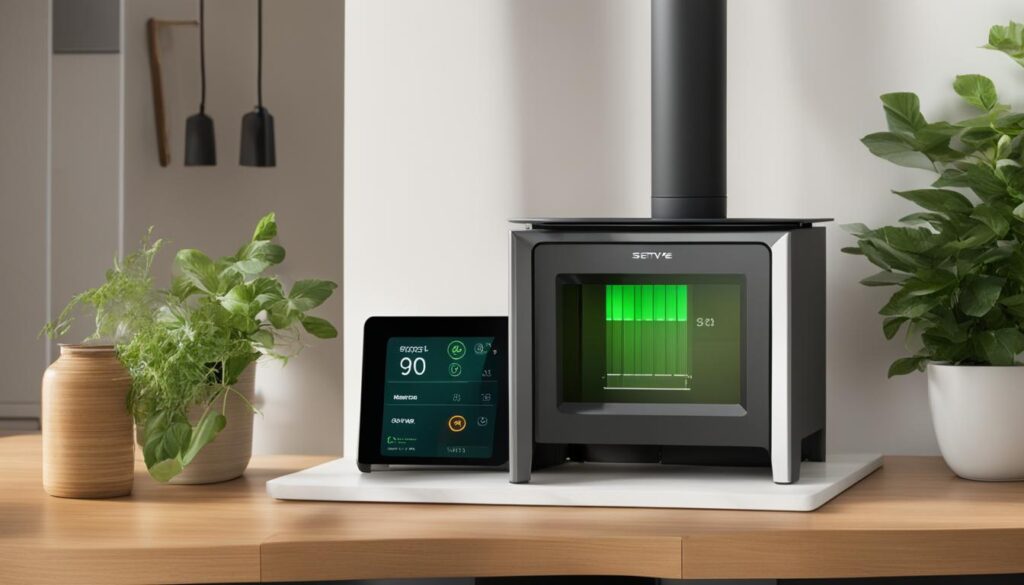
As we’ve discussed, choosing an energy-efficient stove is crucial for maximizing stove energy efficiency and reducing your energy bills. When shopping for a new stove, one of the first things you should look for is its energy rating. Ratings range from A+++ to D, with A+++ being the most energy-efficient and D being the least. The higher the rating, the more energy-efficient the stove is.
Another important factor to consider when choosing an energy-efficient stove is whether it has Energy Star certification. Energy Star is a government-backed program that certifies products that meet strict energy efficiency guidelines. Stoves with Energy Star certification typically use 10-15% less energy than standard models.
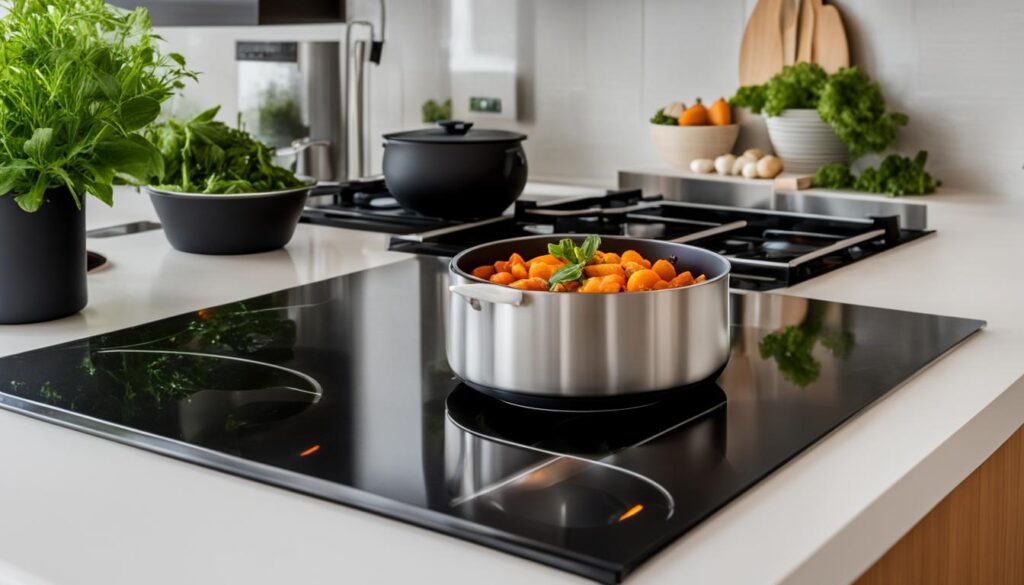
When it comes to stove type, gas stoves are generally more energy-efficient than electric stoves. This is because gas stoves heat up and cool down faster than electric stoves. However, if you prefer an electric stove, look for one with induction technology. Induction stoves use less energy and cook faster than traditional electric stoves.
Finally, consider the size of the stove you need. A larger stove may be more energy-efficient if you regularly cook for a large family or entertain guests. However, if you rarely use all the burners, a smaller stove may be a better choice to minimize energy waste.
Cooking is an essential part of our daily routine, and optimizing our cooking practices can make a significant impact on stove energy efficiency. Here are some tips for maximizing your stove’s performance while minimizing energy waste:
Cover your pots and pans while cooking to help retain heat and reduce cooking time. When cooking without lids, energy is wasted as heat escapes, and cooking takes longer due to the slower heat transfer.
Match the size of your pots and pans to the burner size to avoid wasting energy. For instance, using a small pot on a large burner will result in heat loss, as energy radiates out from the pot’s sides.
Preheating your oven is necessary for some recipes, but it is often not required for others. Avoid preheating when unnecessary, as it wastes energy and increases cooking time.
Cooking in large batches is more energy-efficient than cooking small portions separately. It reduces the time and energy required to heat the stove and cook the food.
Dirt, grease, and other residues can affect stove efficiency. Wipe your stove regularly to remove any debris and keep it in top shape.
Allow your cooked food to cool down completely before storing it in the fridge or freezer. Placing hot food in the fridge or freezer can raise the internal temperature, forcing the appliance to work harder and consume more energy to maintain the set temperature.
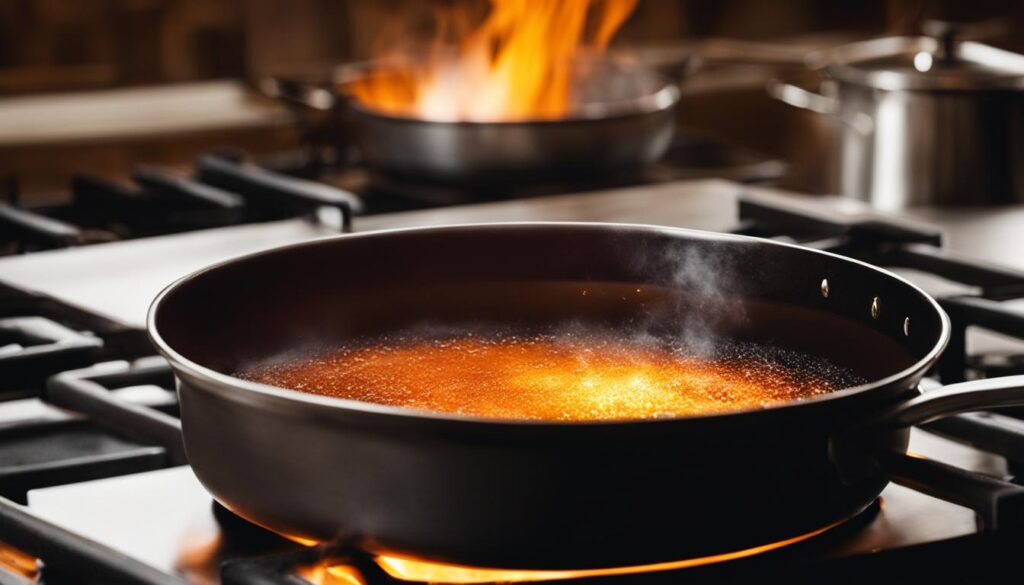
By adopting these stove usage tips, you can make the most of your stove while minimizing energy consumption. Remember, small changes can make significant differences in energy efficiency, leading to long-term benefits for both your wallet and the environment.
As mentioned earlier, proper maintenance and prompt repairs are essential to ensure your stove operates efficiently. Not only does regular maintenance help prevent breakdowns and costly repairs, but it also keeps your stove functioning optimally, reducing energy consumption and associated costs.
One of the most critical maintenance tasks for stoves is cleaning. A dirty stove can impede airflow, affecting its efficiency. We recommend wiping down your stove regularly, especially after cooking, to prevent build-up. Additionally, take the time to remove grates and burners to clean them thoroughly. For gas stoves, ensure the burners are not clogged and the ignition system works appropriately to avoid gas waste.
If you notice any signs of malfunction, such as uneven heating or difficulty adjusting the temperature, it’s essential to get repairs done promptly. Delaying repairs can lead to more significant issues and higher costs in the long run. If you’re not comfortable performing the repairs yourself, consider contacting a professional appliance repair service like Express Appliance Repair (Phone: (647) 492-7773). The experts there can help diagnose the problem and provide energy-efficient solutions to improve your stove’s performance.
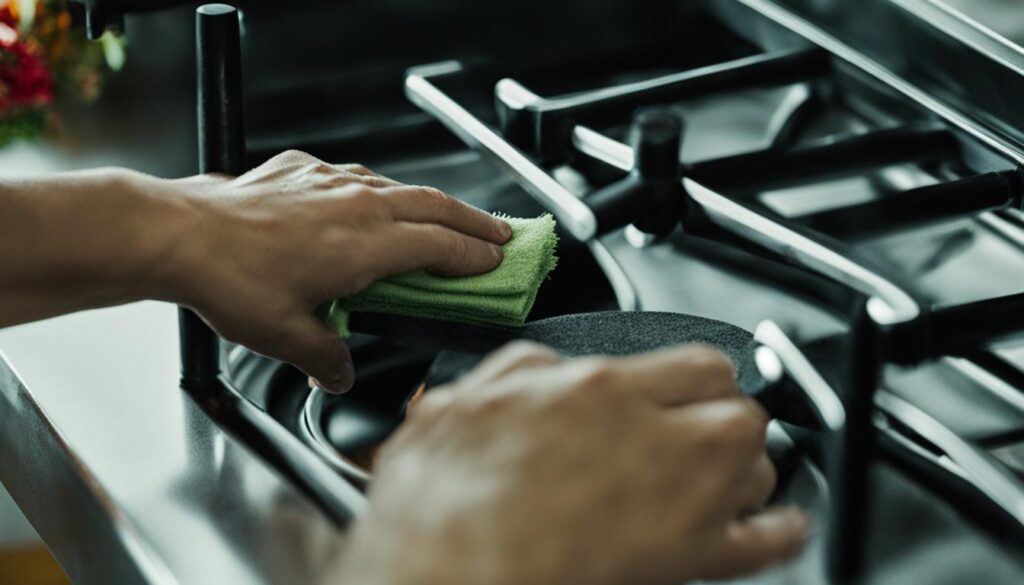
In conclusion, by making stove maintenance and repairs a priority, you can reap the benefits of improved energy efficiency and lower costs. Remember, a well-maintained stove can last longer and function better, providing you with years of reliable use and savings.
If you’re looking for a simple, cost-effective way to boost your stove’s energy efficiency, insulation is the way to go. Insulation can help prevent heat loss and improve the overall performance of your stove. Here are some insulation methods you can use to optimize your stove’s efficiency.
One way to insulate your stove is to use heat-resistant materials, such as ceramic, fiberglass, or mineral wool. These materials are excellent at absorbing and retaining heat, preventing it from escaping through the stove’s surface. You can apply heat-resistant foam or tape to your stove’s doors and around any vents or pipes to keep heat from escaping.
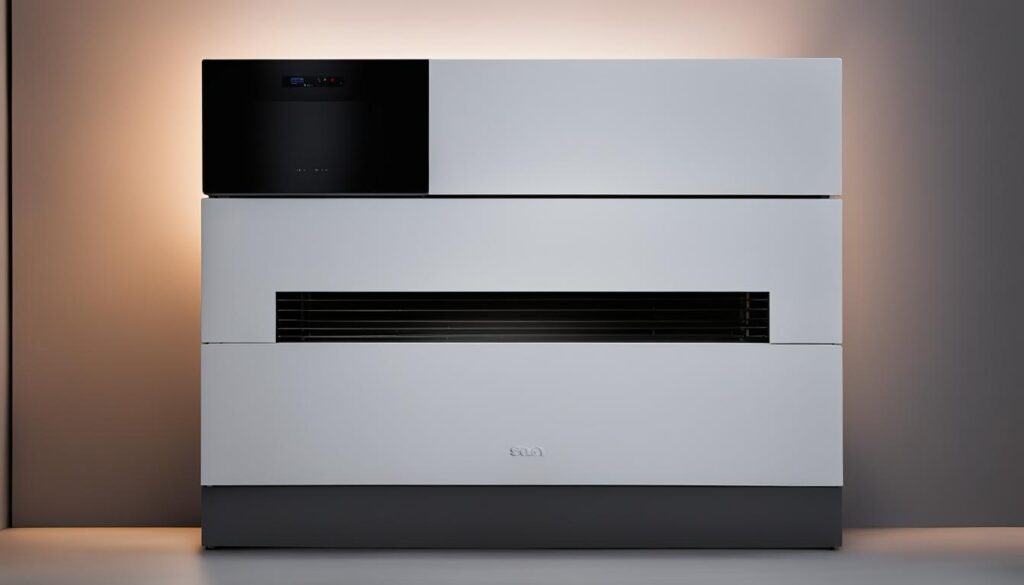
Another effective way to insulate your stove is to seal any gaps or cracks on its surface. These cracks and gaps can allow heat to escape, reducing the efficiency of your stove. You can use heat-resistant sealant to fill in these gaps and cracks, preventing heat loss and improving your stove’s performance. Be sure to check your stove’s doors, vents, and pipes for any leaks that need to be sealed.
In addition to insulating your stove, you can also adopt energy-efficient cooking techniques to further optimize its performance. For example, you can use lids on pots and pans to retain heat, reducing energy waste and cooking time. You can also use the right-sized pans for each burner, as smaller pans waste less heat and energy. Finally, avoid opening the oven door frequently, as this can cause heat loss and increase energy consumption.
By implementing these insulation methods and adopting energy-efficient cooking techniques, you can maximize your stove efficiency and reduce energy waste. Not only will this save you money on energy bills, but it will also contribute to the conservation of valuable resources.
Now that you’ve implemented various strategies to improve stove energy efficiency, it’s essential to monitor and track your progress. By doing so, you can evaluate the impact of your efforts and identify areas for further improvement.
One effective method for monitoring energy consumption is to track your stove’s energy usage. You can do this manually by recording your energy bills regularly and comparing them over time. Alternatively, you can use energy monitoring devices that provide real-time data on your energy usage. These devices can be easily installed on your stove or other appliances, allowing you to track energy consumption more accurately and conveniently.
Another option to consider is upgrading to a smart stove or other smart appliances. These devices are designed to optimize energy efficiency while offering additional features such as remote control and voice command. Smart appliances can also sync with your energy monitoring devices, providing you with real-time data and insights into your energy usage.
By monitoring and tracking your stove’s energy consumption, you can make informed decisions to further improve energy efficiency and reduce your energy bills. We encourage you to explore different options for energy consumption tracking and consider upgrading to smart appliances for a more convenient and energy-efficient home.
Stove energy efficiency refers to the ability of a stove to convert energy input, such as gas or electricity, into usable heat for cooking while minimizing energy waste. An energy-efficient stove consumes less energy while providing the same level of cooking performance.
Stove energy efficiency is important for several reasons. Firstly, it helps reduce energy consumption, which in turn lowers your energy bills. Secondly, it contributes to environmental conservation by minimizing the demand for energy resources. Lastly, an energy-efficient stove can improve cooking performance and heat distribution, resulting in better culinary outcomes.
When selecting a stove, look for models with high energy ratings and Energy Star certification. These indicate that the stove has been tested and proven to meet strict energy efficiency standards. Additionally, consider features like insulation, sealed burners, and efficient heat distribution systems for optimal energy savings.
To maximize stove energy efficiency, try using the right-sized pots and pans that match your burners. Use lids to trap heat and reduce cooking time. Avoid peeking into the oven frequently as it lets out valuable heat. Also, clean burner elements and oven surfaces regularly to ensure efficient heat transfer.
Regular maintenance tasks, such as cleaning burners, checking seals, and calibrating temperature controls, can keep your stove operating efficiently. Promptly addressing any issues or malfunctions through professional appliance repairs can prevent energy waste and ensure optimal stove performance.
Yes, insulating your stove can help prevent heat loss and improve energy efficiency. Consider using heat-resistant materials, such as oven gaskets or heat reflectors, to minimize energy waste. Sealing gaps and cracks around the stove can also reduce heat leakage and enhance stove performance.
There are various energy monitoring devices available that can provide real-time data on your stove’s energy usage. Some smart appliances even offer features to track energy consumption. By monitoring and tracking your stove’s energy consumption, you can identify patterns and make informed decisions to further optimize energy efficiency.